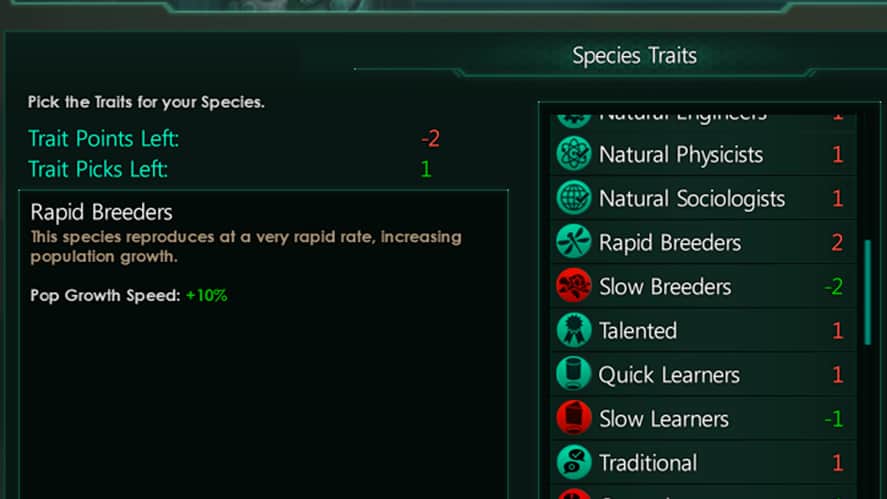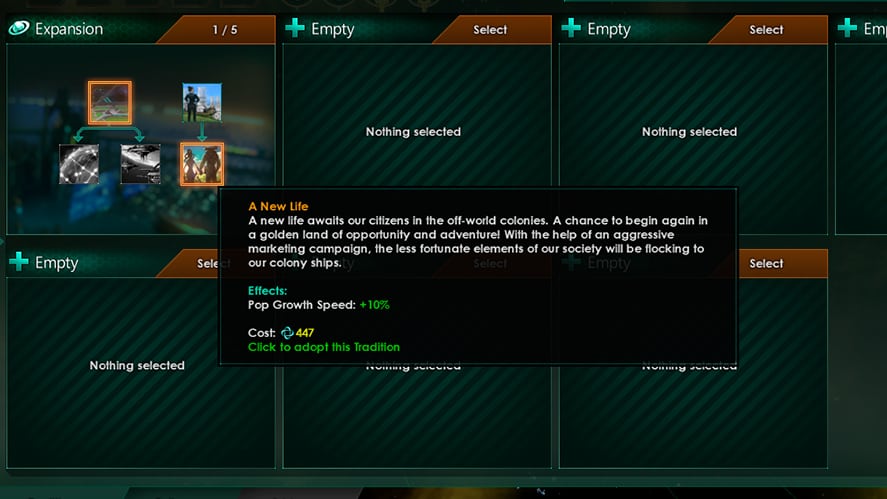Population, or Pops as it is known in-game, is one of the most important resources in Stellaris.
This is true for all stages of the game, but it is most important in the early game.
Recommended Read: What to Do With Influence in Stellaris
An early rush in building your population can give you a great head start.
You can increase your population in Stellaris by colonizing more planets, completing society research projects, colonizing habitable worlds, building population growth buildings, purchasing more population, and through traits and civics, traditions and ascension perks, and edicts.
Table of Contents
How to increase pop growth in Stellaris
You can increase Pop growth in many different ways – you can:
- Colonise more planets.
- Completing Society Research projects.
- Traits and Civics.
- Build Pops.
- “Buy” Pops.
- Building Pop growth buildings.
- Colonise habitable worlds.
- Traditions and Ascension Perks.
- Edicts.
Star empires in Stellaris are not equal, and you won’t be able to use every method of pop growth for your empire.
Here is an explanation of each method and how you can implement them into your next playthrough.
Colonise More Planets
This is by far the best way to increase your population growth in Stellaris.
Each planet you own creates one Pop at a time. If you colonize a second planet, you have doubled your Pop production.
Be wary of spreading your empire too thin when using this strategy. Colonizing is slow and energy-intensive, be sure you have the economy to expand.
Completing Research Projects
Two research projects within the Society Research Tree increase Pop growth. They are Genome Mapping and Cloning.
They both provide a very powerful 10% buff to pop growth speed.
What is great about these bonuses is that they affect all species in your empire. This will benefit empires that contain many alien races.
Traits and Civics
You can work on Pop growth before you even start playing the game. When building your empire, there are Traits and Civics which can boost your Pop growth.
Some of the Traits are; Rapid Breeders, Nivlac, Radiotrophic, and Nomadic.

Civics that provide pop growth are; Corvée System, Inward Perfection, Pleasure Seekers, and Corporate Hedonism.
Not every Trait and Civic is available to every empire. Also, be sure to read your Traits carefully, some provide a negative modifier to Pop growth, and we don’t want that.
Building Pops
A very early research option for most biological empires is Robotic Workers. When completed, this allows you to build Robot Assembly Plants.
Robotic Pops are similar to biological pops. They have traits, need upkeep, and carry out jobs within the empire.
Early on, your robots will only be able to carry out basic work, but they can be upgraded to become quite advanced.
Building Pops is the only way Machine Empires can increase their robot population.
“Buy” Pops
There are empires out there that have no qualms about enslaving other races.
Once the galactic market is formed and your empire joins, you have the option to buy slaves.
Slaves have a base cost of 1000 Energy Credits, which is then modified by the race’s traits.
If your empire allows slavery, any pops bought this way are added to your empire as slaves.
If, like me, your empire outlaws slavery, you can still enjoy the slave market. For you, slave Pops will have a base cost of 2000 Energy Credits.
Purchased Pops are set free and then taken in by your empire as citizens. You will need the Megacorp DLC to use the slave market.
Creating Pop Growth Jobs
When you build Districts or Buildings on your planets, they create jobs for your Pops to carry out.
Different jobs provide different resources or modifiers to your empire.
Some jobs provide bonuses to pop growth for the planet where the job is.
Medical Workers from Gene Clinics and Entertainers provide small buffs to Pop growth. This method is more for the min maxers out there.
Sometimes it can be helpful if you need to rush a planet or attempt the one-planet challenge.
Colonise Habitable Worlds
Every biological species in the game has a climate preference. There are three climates in the game; dry, wet and frozen.
Your empire’s homeworld will fit into one of these three categories. When selecting planets to colonise, you should look out for ones with the same climate as your home world.
Every planet has a habitability score, expressed as a percentage. For every 1% below 100, you will receive a -0.5% debuff to Pop growth speed. Keep this in mind when expanding in the early game.
Traditions and Ascension perk
As you progress through your playthrough, you will be able to access the Tradition Trees.
There are two Tradition Trees that can provide a buff to Pop production.
The Expansion tree and the Cybernetic tree both offer a 10% Pop growth speed bonus.
When you complete a Tradition Tree you get to select a powerful Ascension Perk.

The perk we are after is Xeno-Compatibility. This provides a huge 20% increase in pop growth speed on planets that have at least two species on them.
Edicts
Last but not least, there are Edicts. Edicts are paid for modifiers you can apply to your empire for as long as you wish to pay the cost.
The Pop growth Edicts need to be researched before you can use them. They are paid for using Unity and your empire’s Edict Fund.
Going over your Edict Fund will increase the Unity upkeep considerably. So be sure to monitor your Edict spending carefully.
As you can see, Pop growth is an ongoing process through all game stages in Stellaris.
There is no instant fix, and your Pop growth will need to be nurtured at all stages of your empire’s life cycle.
That’s how to increase your population in Stellaris!
If you have any suggestions for this guide, please let us know in the comments section. Have a great day.




